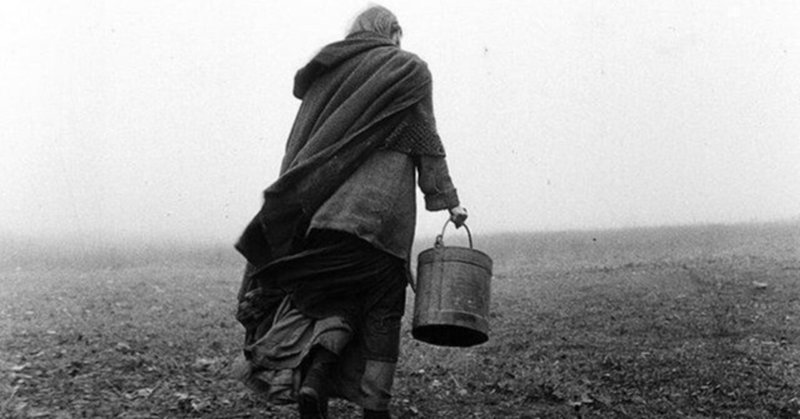
🏚ニーチェの馬🏚
シンプルをきわめた食事。娘はただジャガイモを2つ茹でるだけだ。茹でたてを無造作にテーブルのお皿に取り分ける、父の分と自分のと。大ぶり小ぶりの多少の差はあれど、取り分けに繊細は不要だ。片腕が不自由な父は左手で熱々のジャガイモの皮を火傷に留意しながら素早く剥き、ぎゅっとつぶし細かくしてほおばる。
A meal of extreme simplicity. My daughter just boils two potatoes. I casually divided the freshly boiled food into plates on the table, one for my father and one for myself. Although there are some differences between large and small, there is no need to be particularly delicate. My father, who is disabled in one arm, quickly peels the skin of a hot potato with his left hand, being careful not to burn himself, then crushes it into small pieces and enjoys it.
(2011年
Hungaryハンガリーの映画🎥
日本では2012年に公開されています。
私も2013年にtsutayaでレンタルして、観ました。)
「This work was inspired by Nietzsche's anecdote about how he cried while hugging the neck of a horse in a square in Turin, and then went insane. However, Nietzsche does not appear in the story, and the entire story depicts the lives of a parent and child in a world of Nietzschean nihilism. Tal Béla has publicly announced that this film will be his last directorial effort.
トリノの広場で泣きながら馬の首をかき抱き、そのまま発狂したというニーチェの逸話にインスパイアされて生まれた。しかしニーチェが登場することはなく、全編ニーチェ的なニヒリズムの世界におけるとある親子の生活が描かれる。 タル・ベーラは本作を最後の監督作として公言している。」
🪔今のz世代の子供たちが、
食べる音をbgmにするような感覚に1ミリほど、似ているでしょうか🪔
この記事が気に入ったらサポートをしてみませんか?
